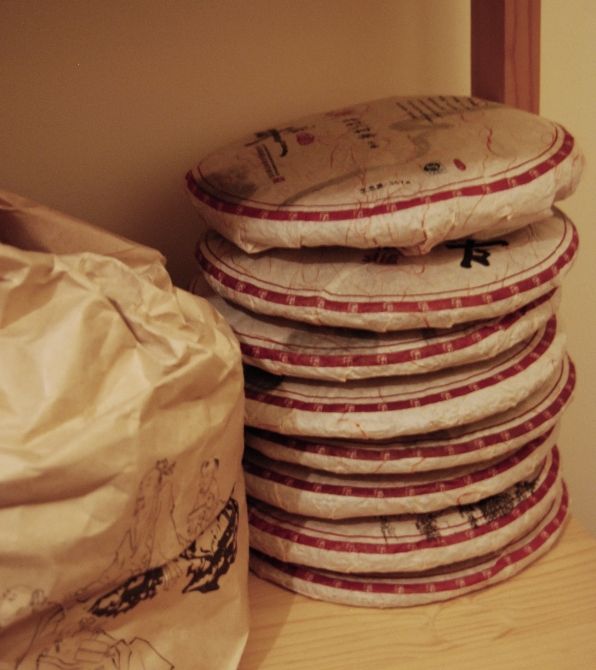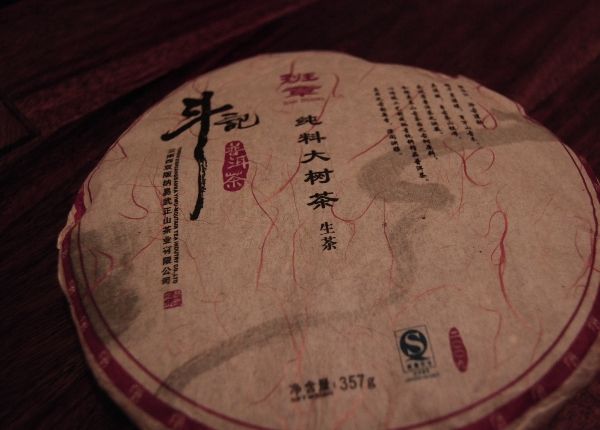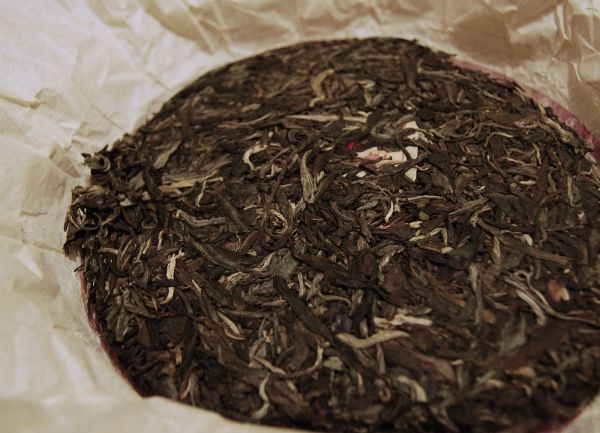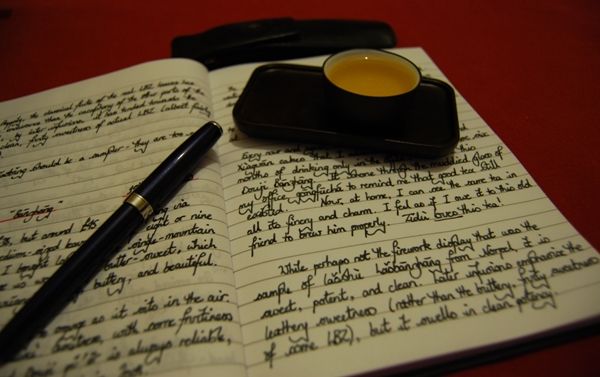I'm an old fan of Douji, but I didn't realise until I delved into Taobao that there are many more cakes available from the producer (Yiwu Zhengshan Company) each year, and that the Western-oriented vendors had been selling only the bottom rung of the ladder.
Anxious to remedy the situation, some chums and I ventured into a hefty Taobao purchase of Douji's entire range of single-mountain cakes from last year. Since then, Dragon Teahouse has got the entire lot in stock, at very similar prices to those we obtained from Taobao (after considering shipping, handling, etc.).
This is A Good Thing.
A stack of Douji-related goodness
Douji is a large producer, and so one shouldn't expect great big piles of laoshu [old tree] cakes, but what they make, they make very well (I believe). The quality control is very good. They also provide tons of entry-level cakes for those wanting a less expensive option, and even they are very appealing. I'm sure you've seen the cute little matchbox-sized bricks (Shengdou, Dajou) cropping up from time to time (I bought mine from Puerh Shop). My remaining impression of those was a clean, fresh character that was almost milky. In 2009, there were a collection of actual bingcha of similar recipes.
The "Banzhang" in its outer wrapper, typical of the entire series
Given that this bing is "Banzhang", we should limit our expectations. I thought that it would make a good comparison with the 2009 Zhimingdu "Lao Banzhang" that you may remember from a few days back.
One aspect of Douji bingcha that appeals to me is that they don't make a lot of garndiose claims. There are no "Cha Wang" [tea king], let alone the Xizihao-style hyperbole of "Cha Huang" [tea emperor]. Do you get tired of such claims? They wear me out. It's entirely daft to call your sub-$20 cake an "old-tree tea-king", as so many budget labels tend to do - it discredits the producer and seller alike.
So, Douji names this "Banzhang", and doesn't even claim "Lao Banzhang" [old Banzhang] status, which would refer to the tiny original village where the various malpractices that I alluded to previously have occurred.
I find it refreshing to have some honesty in pu'er
Nomenclature aside, the proof of the pudding is in the tasting...
Most cakes in this series appear to have similar small- and medium-sized leaves
First impressions are highly positive: the soup is a brutally clean yellow, which darkens to orange as it sits in the air. Again, I appreciate the honesty. Pre-orange'd cakes are as tiring as "laoshu zhengshan qiaomu chawang" to me, these days - I want clean, pure pu'er. I love producers that don't "dumb it down" for their audience.
It tastes a lot like Banzhang. It has plenty of sweet leather, with the grape-like fruitiness over the top that reminds me of this area's tea. It has a quality that you cannot hide - it is vibrant, arresting, appreciably bitter (in the desirable "kuwei" manner), and lasts ages.
A very solid and enjoyable example
The endurance throughout a long series of infusions is a good indicator of quality tea: my cheaper teas run out of steam quite quickly, or become rough before they die. This tea marches on regardless, fading gracefully into sweetness without breaking down into anything harsh.
That's not to say that it isn't bitter - it is powerful and sharp, but it never becomes rough. My best teas have this in common, more or less.
While not the firework display of a serious laoshu Banzhang, it is a highly enjoyable cake. If you're after a reliable, tasty sampler of this mountain, it's well worth a look.
Friends will know that I am particularly close to this tea: during my six months of enforced abstinence from gongfucha, I was restricted to drinking in my office, where the water is poor and only available from a vacuum flask. I kept myself to a half-dozen or so very ordinary cakes (Dayi, Xiaguan), which, while nice enough, are very definitely a league or two below Douji. I would occasionally break down and treat myself to a session from this cake. It managed to shine through the muddied window of my office brewing, to remind me that really decent tea was still out there.





10 comments:
Thanks for the review, now I know what to expect when I drink mine (don't know when) and I'm glad that I got a couple of this cakes.
"Pre-orange'd cakes are as tiring as "laoshu zhengshan qiaomu chawang" to me, these days - I want clean, pure pu'er. I love producers that don't "dumb it down" for their audience." I can't agree more to this!
Apache
Hooray - the blog roll is back !!
Thank you very much !! :)
I didn't know that they could pre-orange cakes. But then again, I really shouldn't be surprised, as some manufacturers will go to any lengths for money.
Kuwei...that was something lacking in the Xia Guan Jia Ji Toucha that I had. Hopefully the pu'er I have on order will remedy that.
Hello Hobbes,
Great information! I noticed that the mini-brick Douji offerings match their line of full cake. Out curiosity, how do the mini-bricks compare to the cakes? In your estimation, are they made of the same material?
Happy steeping,
TGY
Apache - I know you like your pre-2006 tea! I am with you, but have some very nice cakes from the past few years. The mean quality may have shifted, of course.
Kim - the people have spoken. :)
Corey - by "pre-orange'd", I just mean manipulated, either by accident or design, into being less aggressive, more friendly, more malty, darker and redder. Plenty of modern cakes have this - it is getting harder and harder to find obtain untreated, unapologetically green shengpu.
Tieguanyin - I have only tried the Dadou and Shengdou bricks, so far. So, I have not tried the cake equivalents of these cheaper recipes, nor have I tried the brick equivalents of the more expensive bingcha recipes. It is likely that they are just the same leaves, with the same treatment, just formed into different shapes. There is only one way to find out, however!
Toodlepip,
Hobbes
Dear Hobbes,
We you say: "it is powerful and sharp, but it never becomes rough".
What do you mean exactly by rough?
Unpleasant in what particular way If I may ask?
Maxwell2079
Best wishes.
PS: I sent you an email.
Dear Max,
Some teas "crack apart" and get abrasive in the throat while they go on. This can be a sign of bad leaves. The very best leaves march on giving excellent brews for ever. Plantation leaves tend to taste "green", vegetal, and abrasive quite quickly. Other leaves inhabit a space on the spectrum between these two extremes.
I don't appear to have received your e-mail!
Toodlepip,
Hobbes
Found it! Your e-mail was caught in my spam filter. I'll reply as soon as I can. :)
Thank you Hobbes.
Look forward to your reply.
Maxwell2079
E-mail sent! To the inboxes!
Toodlepip,
Hobbes
Post a Comment